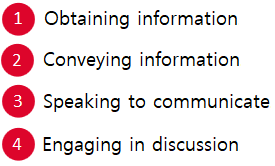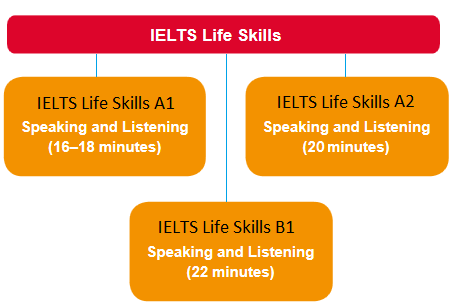IELTS Life Skills
![]()
What is the ‘IELTS Life Skills’ test:
‘IELTS Life Skills’ is an English language assessment test for those who need to prove their English “speaking” and “listening” skills to acquire a UK VISA. This test is available at Common European Framework of Reference for Languages (CEFR) levels A1, A2 and B1. It is designed to meet the requirements of UK Visas and Immigration (UKVI) for certain visa categories and other immigration purposes.
The ‘IELTS Life Skills’ test is included on the UK Home Office’s list of Secure English Language Tests (also referred to as SELT tests) and is available both in the UK and internationally. This test is offered by the three IELTS Test Partners – British Council, IDP: IELTS Australia and Cambridge Assessment English.
Who should take this test:
“IELTS Life Skills” test is intended for those who want to move to the United Kingdom (UK) as a family member of an already UK citizen or want to apply for ‘indefinite leave to remain or citizenship’ visa category. There are three formats of this test – “IELTS Life Skills A1“, “IELTS Life Skills A2” & “IELTS Life Skills B1“.
If you would like to apply for a ‘family of a settled person’ visa, take the “IELTS Life Skills A1” test.
If you are already in the UK under the ‘family of a settled person’ visa, you will need to take the “IELTS Life Skills A2” test. This test is for ‘family route migrants’ seeking to extend their stay in the UK. After two-and-a-half years in the UK, non-EEA national partners and parents on the family route will need to take this test in order to qualify for further leave to remain on the ‘five-year partner or parent route’ to settlement. This test is offered in the UK only and someone outside the UK can’t take the “IELTS Life Skills A2” test.
![]() If you are applying for an ‘indefinite leave to remain or citizenship in the UK’ visa, take the “IELTS Life Skills B1” test.
If you are applying for an ‘indefinite leave to remain or citizenship in the UK’ visa, take the “IELTS Life Skills B1” test.
In simple words, you need to take the ‘IELTS Life Skills’ test if you want to move to the UK to your family who already live(s) there. Besides, if you are already in the UK and need to prove your English communication skills to extend your visa for indefinite leave or citizenship category, you might need to take this test.
Notes:
» ‘Family of a settled person’ visas: If you want to remain with a relative, spouse or partner already living in the UK permanently.
» Indefinite leave to remain: If you are already living in the UK and want to make it your permanent home.
» Citizenship: If you want to become a British citizen.
Summary:
“IELTS Life Skills A1” is for the family route
• As a partner of a settled person (spouse/partner)
• As a parent (parent of a dependant).
“IELTS Life Skills A2” is for the family route (visa extension)
• As a partner of a settled person (spouse/partner)
• As a parent (parent of a dependant).
IELTS Life Skills B1 is for indefinite leave to remain
• Settlement/permanent residency.
IELTS Life Skills B1 is for British Citizenship visa
• Naturalisation.
You are advised to contact the UK Visas and Immigration authority to confirm which type of test you need to take.
Who should NOT take this test:
If you want to study or work in a country where English is the first language (e.g. the United Kingdom, Australia, Canada etc.), you probably need to take the IELTS General Training or IELTS Academic test. If you want to migrate to one of these countries as a skilled person, you will probably need to take IELTS GT exam.
Which skills are assessed in “IELTS Life Skills” test?
In an “IELTS Life Skills” test, only your ‘Speaking‘ and ‘Listening‘ skills will be assessed. Unlike IELTS GT or IELTS Academic test, you do NOT take any Reading or Writing section.
Note:
During the test, you will be allowed to take notes to prepare your answers. The examiner will not mark your notes, only your speaking and listening skills are marked.
The format of the IELTS Life Skills test:
IELTS Life Skills test has been designed to assess an applicant’s ability to demonstrate his/her ‘Speaking’ and ‘Listening’ skills only. A candidate takes the test with another test taker and an examiner. The candidate’s performance on both Speaking and Listening will be assessed during this one session.
Note:
‘IELTS Life Skills A1’ is also referred to as ‘IELTS Life Skills at CEFR Level A1’ while ‘IELTS Life Skills A2’ is referred to as ‘IELTS Life Skills at CEFR Level A2’. Besides, ‘IELTS Life Skills B1’ is also known as ‘IELTS Life Skills at CEFR Level B1’. CEFR stands for Common European Framework of Reference for Languages.
IELTS Life Skills A1 exams take around 16–18 minutes, while IELTS Life Skills A2 exams take less than 20 minutes (18-20 minutes). Finally, IELTS Life Skills B1 lasts for approximately 22 minutes.
You should already know whether you need to take IELTS Life Skills A1, IELTS Life Skills A2 or IELTS Life Skills B1 test.
Please note that there is no break between “speaking” and “listening” components/tests as you will be assessed on both skills at the same time.
What you can expect in your IELTS Life Skills test:
During the exam, you will meet another test takers and a designated IELTS examiner. You will be asked/instructed to talk to the other test taker while the IELTS examiner will assess your performance throughout the Speaking and Listening test based on four criteria:
(a) Your ability to obtain information.
(b) How you convey information.
(c) Your speaking skill to communicate.
(d) Your spontaneous engagement in discussions.

You will not know beforehand about the candidate who will take the exam with you, and how skilled he/she would be. However, the performance of the other test taker paired with you in the IELTS Life Skills test will not affect the assessment of your own performance. So even if the other candidate does not communicate effectively or does not have good command in English speaking and listening, you always need to do your best.
Test results:
Your IELTS Life Skills result will be available within seven days (/a week) from your test date. Currently, you cannot get the result of your IELTS Life Skills test online. Only the Test Result Form (TRF) is sent to the postal address mentioned by you in the application/registration form.
In your IELTS Life Skills test, you either pass or fail. Unlike the IELTS GT or Academic test, there is no band score in IELTS Life Skills test. If you pass the test, your score will be verified using the IELTS SELT (Secure English Language Tests) Consortium online system using a unique reference number which should be stated on the application form. However, you will receive a copy of the IELTS Life Skills Test Report Form. If you fail, your test result cannot be used for your visa application.
Re-taking the test:
There is no restriction on how many times you can take the IELTS Life Skills test. However, if you pass the test once, you will not be able to re-take it at the same level for a duration of two years. Having said that, you may take another test which is not the same level. For instance, if you take the IELTS Life Skills A1 today, you can take IELTS Life Skills B1 test anytime you want or the vice versa. Finally, If you do not pass the test, there are no restrictions on re-taking the test.
More Resources:
Register for an IELTS Life Skills test/ Find a test location

